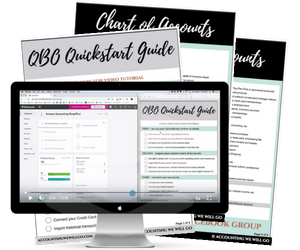Are you confused about business tax deductions?
A question commonly asked by e-commerce sellers is what is deductible on a business tax return. The key to understanding what is and isn’t deductible is whether or not an expense is ordinary and necessary.
The IRS definition of “ordinary and necessary” is this: an ordinary expense is one that is common and accepted in your trade or business. A necessary expense is one that is helpful and appropriate for your business.
Please note: This post is a general guide for Amazon, eBay, and other inventory-based business owners and should not be used when preparing your tax return. It is very important that you hire a Certified Public Accountant (CPA) to prepare your tax return for you. You can certainly hire a bookkeeper to do your books, or you can do them yourself, but please be sure you budget adequately so you can hire a CPA to prepare and file your tax return for you.
If you haven’t begun to manage your accounting, or if you’ve fallen behind and don’t know how to get organized, enter your information below to get our FREE QBO Quickstart Guide including a video tutorial and Chart of Accounts specific to your e-commerce business to help you set up an accounting system with QuickBooks Online.
NEED HELP WITH YOUR QBO SETUP?
Grab our FREE QBO Quickstart Guide with video tutorial and Chart of Accounts.
1 - Are family vacations deductible?
There is a tendency in the e-commerce community to think it is allowable to take a family vacation to an amusement park, and as long as the seller sources inventory in the park, or on the way to and from the park, the entire trip for the entire family is deductible.
There are two issues with this; the first is that a business expense is deductible for the business owner only, and not the entire family. (For example, if you, as the business owner, need one hotel room, you can possibly deduct 100% of the cost even if you and a spouse are sharing the room. However, if you get a suite so your kids can have a separate room, generally you can only deduct the cost of a single room, not a suite.)
The second issue is that a trip to an amusement park is likely not “necessary,” even though it may be considered “ordinary.” (Wouldn’t it be nice if amusement park trips were considered necessary!)
Sellers regularly share online articles with me about “How to Expense your Entire Family Vacation,” or “Six Ways to Write Off Your Next Family Vacation.” Yes, those articles are out there but the suggestions in those articles could possibly get you in trouble. Remember, if it’s too good to be true, it probably is. However, PLEASE do not get tax advice from the internet; be sure your CPA that you have engaged to prepare your tax return is assisting you in determining taxable eligibility for expenditures.
There is no telling what the IRS will flag, so please do not try to reduce your taxable income with expenses that are not legitimate. If you are unsure, ask your CPA.
2 - What about entertainment expenses? Can I deduct those?
The 2017 Tax Reform Act signed on December 22, 2017, will apply to the 2018 tax year. The new tax act establishes additional limitations on the deductibility of certain business meals and entertainment expenses. Under the act, entertainment expenses incurred or paid after Dec. 31, 2017 are nondeductible unless they fall under the specific exceptions in Code Section 274(e).
In other words, entertainment expenses were possibly eligible for deduction in 2017, but in 2018, entertainment expense is no longer deductible.
There are additional changes, so be sure you are familiar with those. (For example, sporting event tickets were considered partially deductible if certain conditions were met, but beginning in 2018, there is no deduction allowed for sporting events.)
3 - Can I deduct gifts for employees?
Many sellers are generous and want to acknowledge or reward their employees with gifts. Some sellers are under the mistaken impression, by doing so, they can take a deduction on their books for the expense with no revenue consequence to the recipient. They also mistakenly think there is no limit to the business deduction allowable.
To clarify, per the IRS, “If you give gifts in the course of your trade or business, you can deduct all or part of the cost.” Further, “You can deduct no more than $25 for business gifts you give directly or indirectly to each person during your tax year. A gift to a company that is intended for the eventual personal use or benefit of a particular person or a limited class of people will be considered an indirect gift to that particular person or to the individuals within that class of people who receive the gift.”
Keep in mind that if a business owner and their spouse both give gifts, both the business owner and spouse are treated as one taxpayer. What this means is the business owner and the spouse, together, are limited to a $25 deduction on their return. They cannot take a $50 deduction on their return for the gift. (Same with a partnership with multiple partners; it is treated as one taxpayer no matter how many partners there are.)
Also remember that a gift to an employee is taxable to the employee.
4 - What kind of documentation do I need for deductible expenses?
If you have deductible expenses, you must be able to prove (substantiate) certain elements of expense. By keeping timely and accurate records, you will have support to show the IRS if your tax return is ever examined (audited.)
The primary requirement is that you must have adequate evidence. While a receipt from purchase or invoice is typically substantial, the IRS is very specific about what documentary evidence is required for travel and entertainment expenses. The document/invoice/receipt should show the amount, date, place, and essential character of the expense.
Per the IRS, “A hotel receipt is enough to support expenses for business travel if it has all of the following information:
· The name and location of the hotel
· The dates you stayed there
· Separate amounts for charges such as lodging, meals, and telephone calls
However, a restaurant receipt is enough to prove an expense for a business meal if it has all of the following information:
· The name and location of the restaurant
· The number of people served
· The date and amount of the expense
If a charge is made for items other than food and beverages, the receipt must show that this is the case.
5 - What are examples of expenditures that are not allowable as deductions?
You cannot take a deduction for meals when no business was conducted, potentially night clubs and cocktail loungers, country clubs, theaters, athletic and golf clubs, sporting events, and/or hunting, fishing, or similar trips.
Hopefully you are not still confused!
Remember, if it was possible to take a business deduction for family vacations, limitless entertainment, and other “fun” things, everyone would start a small business to do so. It is not possible to deduct an entire family vacation, entertainment, gifts or anything that is not ordinary and necessary. If you are unsure, do not guess. Ask your CPA. You do not want the effort to reduce taxable income to result in an audit. While there are certainly gray areas, let your conscience and your CPA be your guide!
Most importantly, if you haven’t begun to manage your accounting, or if you’ve fallen behind and don’t know how to get organized, enter your information below to download our FREE QBO Quickstart Guide to get you started using QuickBooks Online, including a video tutorial and Chart of Accounts specific to your Amazon business.




